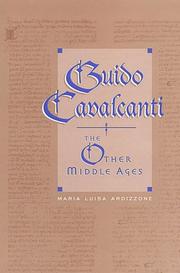| Listing 1 - 4 of 4 |
Sort by
|
Book
ISBN: 9781926836867 9781926836850 1926836863 1926836855 9781926836843 1926836847 1280486759 9781280486753 9786613581983 6613581984 Year: 2012 Publisher: Edmonton, [Alberta] : AU Press,
Abstract | Keywords | Export | Availability | Bookmark
 Loading...
Loading...Choose an application
- Reference Manager
- EndNote
- RefWorks (Direct export to RefWorks)
The fact that Cavlacanti’s friend, Dante Alighieri, was a supremely fine poet ought not blind us to Cavalcanti’s own, rather different excellence. Both men were attracted to the dolce stil nuovo, the “sweet new style” that emerged in thirteenth-century Florence. While Dante’s poetry was devoted to his childhood sweetheart, Beatrice, Cavalcanti’s poetry had more the tang of real-world experience: he struggled against unruly passions and sought instead to overcome love – a source of torment and despair. It is chiefly through the translations of Rossetti and Pound that English-speaking readers have encountered Cavalcanti’s work. Pound’s famous translation, now viewed by some as antiquated, is remarkably different from the translation provided here in the graceful voice of poet David Slavitt. Working under the significant restraints of Cavalcanti’s elaborate formal structures, Slavitt renders an English translation faithful to the original poetry in both rhyme and rhythm.
Book
ISBN: 0714550434 9780714550435 9781847492944 Year: 2010 Publisher: Richmond, Surry, UK
Abstract | Keywords | Export | Availability | Bookmark
 Loading...
Loading...Choose an application
- Reference Manager
- EndNote
- RefWorks (Direct export to RefWorks)

ISBN: 0802035914 9786612014703 1282014706 144267556X Year: 2002 Publisher: Toronto Buffalo London University of Toronto Press
Abstract | Keywords | Export | Availability | Bookmark
 Loading...
Loading...Choose an application
- Reference Manager
- EndNote
- RefWorks (Direct export to RefWorks)
"Guido Cavalcanti (d. 1300) is one of the greatest Italian poets of all time. His legacy consists of some fifty poems, of which his canzone on the nature of love, Donna me Prega, is the most famously difficult and complex. The poem is important not only because it sheds light on fundamental intellectual debates during the time of Dante, but also because of its influence on generations of poets and intellectuals. In this study, Maria Luisa Ardizzone sets Donna me Prega in an entirely new light - first, by examining its role in Cavalcanti's poetic practice, and second, by placing it in the context of ancient and medieval science and philosophy. The book deals with issues that are part of the intellectual history of Europe in the thirteenth century. Cavalcanti's work is interpreted by reconstructing the debate of ideas in which it participates, and the new model of poetry devised by Cavalcanti is one of the subjects of this book."--Jacket
Book

ISBN: 2878549856 2878546938 Year: 2018 Publisher: Paris : Presses Sorbonne Nouvelle,
Abstract | Keywords | Export | Availability | Bookmark
 Loading...
Loading...Choose an application
- Reference Manager
- EndNote
- RefWorks (Direct export to RefWorks)
Ce volume est le fruit d’un colloque organisé en février 2016 à la Sorbonne Nouvelle par le CERLIM. L’enjeu premier était d’offrir un état de la réflexion sur Guido Guinizzelli et Guido Cavalcanti, les deux poètes du XIIIe siècle au programme de l’agrégation d’italien en 2016 et 2017. Réunir la plupart des meilleurs spécialistes fournissait dès lors l’occasion de prendre connaissance des dernières avancées interprétatives en la matière. Le résultat est donc un ouvrage à la fois pédagogique et novateur qui, attentif aux contextes qui ont vu naître nos deux auteurs, cherche à examiner chacun d’eux pour lui-même tout en tâchant de mieux cerner la nature de leurs rapports. C’est un livre au sens propre, où circulent les voix d’un intense dialogue, parfois contradictoire, notamment en ce qui concerne le second Guido. Cela ne veut pas dire que le dernier mot soit dit. L’extraordinaire richesse et problématicité de la poésie cavalcantienne est un défi pour l’interprétation et continuera de solliciter la sagacité des herméneutes. La poésie du premier Guido reste elle aussi pleine de secrets à percer, notamment pour ce qui est de son arrière-plan culturel, scientifique, philosophique. Ce livre en appelle donc d’autres, dont il espère pouvoir nourrir la réflexion. This volume is the result of a symposium held in February 2016 at the New Sorbonne University by the CERLIM. Its prime aim was to provide a review of current research on Guido Guinizzelli and Guido Cavalcanti, the two 13th century poets included on the 2016 and 2017 program of the Agrégation d’Italien. Reuniting most of the best specialists provided an opportunity to learn about the latest interpretative advances on the topic. The results is thus a volume both educational and innovative. Attentive to both authors’ writing contexts, it seeks to examine each one for himself while trying to better our understanding of their relationship’s nature. This is a book in the true sense where circulate the voices of an…
Guinizzelli, Guido, --- Cavalcanti, Guido, --- Criticism and interpretation --- Di Magnano, Guido Guinizelli, --- Guinicelli, Guido, --- Guinizelli di Magnano, Guido, --- Guinizelli, Guido, --- Magnano, Guido Guinizelli di, --- Literature, Romance --- Poetry --- Medieval & Renaissance Studies --- Guido Guinizelli --- Guido Cavalcanti --- poésie italienne médiévale --- philosophie médiévale de l'amour
| Listing 1 - 4 of 4 |
Sort by
|

 Search
Search Feedback
Feedback About UniCat
About UniCat  Help
Help News
News